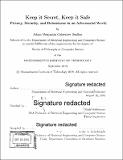| dc.contributor.advisor | Shafi Goldwasser. | en_US |
| dc.contributor.author | Sealfon, Adam Benjamin Gelernter. | en_US |
| dc.contributor.other | Massachusetts Institute of Technology. Department of Electrical Engineering and Computer Science. | en_US |
| dc.date.accessioned | 2020-03-09T18:53:03Z | |
| dc.date.available | 2020-03-09T18:53:03Z | |
| dc.date.copyright | 2019 | en_US |
| dc.date.issued | 2019 | en_US |
| dc.identifier.uri | https://hdl.handle.net/1721.1/124090 | |
| dc.description | Thesis: Ph. D., Massachusetts Institute of Technology, Department of Electrical Engineering and Computer Science, 2019 | en_US |
| dc.description | Cataloged from PDF version of thesis. | en_US |
| dc.description | Includes bibliographical references (pages 239-249). | en_US |
| dc.description.abstract | The deployment of large-scale systems involving many individuals or devices necessitates the design of computational frameworks that are resilient to failures or malicious actors. This thesis introduces algorithms and definitions for a series of problems concerning robustness, security, and privacy in the many-party setting. We describe protocols for maintaining a stable configuration despite adversarial perturbations, for cryptographic tasks involving secure multiparty computation and anonymity-preserving authentication, and for privacy-preserving analysis of networks. The results presented span the fields of distributed algorithms, cryptography, and differential privacy. We first model and describe a protocol for the problem of robustly preserving a stable population size in the presence of continual adversarial insertions and deletions of agents. Turning to cryptography, we explore the possibility of leveraging an infrastructure for secure multiparty computation, characterizing which networks of pairwise secure computation channels are sufficient to achieve general secure computation among other sets of parties. We next introduce a definitional framework and constructions for ring signatures that provide more fine-grained functionality, explicitly delineating whether parties can convincingly claim or repudiate authorship of a signature. Finally, we turn to differential privacy for graph-structured data. We present efficient algorithms for privately releasing approximate shortest paths and all-pairs distances of a weighted graph while preserving the privacy of the edge weights. We also present efficient node-private algorithms for computing the edge density of Erdős-Rényi and concentrated-degree graphs. | en_US |
| dc.description.statementofresponsibility | by Adam Benjamin Gelernter Sealfon. | en_US |
| dc.format.extent | 249 pages | en_US |
| dc.language.iso | eng | en_US |
| dc.publisher | Massachusetts Institute of Technology | en_US |
| dc.rights | MIT theses are protected by copyright. They may be viewed, downloaded, or printed from this source but further reproduction or distribution in any format is prohibited without written permission. | en_US |
| dc.rights.uri | http://dspace.mit.edu/handle/1721.1/7582 | en_US |
| dc.subject | Electrical Engineering and Computer Science. | en_US |
| dc.title | Keep it secret, keep it safe : privacy, security, and robustness in an adversarial world | en_US |
| dc.title.alternative | Privacy, security, and robustness in an adversarial world | en_US |
| dc.type | Thesis | en_US |
| dc.description.degree | Ph. D. | en_US |
| dc.contributor.department | Massachusetts Institute of Technology. Department of Electrical Engineering and Computer Science | en_US |
| dc.identifier.oclc | 1142631941 | en_US |
| dc.description.collection | Ph.D. Massachusetts Institute of Technology, Department of Electrical Engineering and Computer Science | en_US |
| dspace.imported | 2020-03-09T18:53:02Z | en_US |
| mit.thesis.degree | Doctoral | en_US |
| mit.thesis.department | EECS | en_US |
